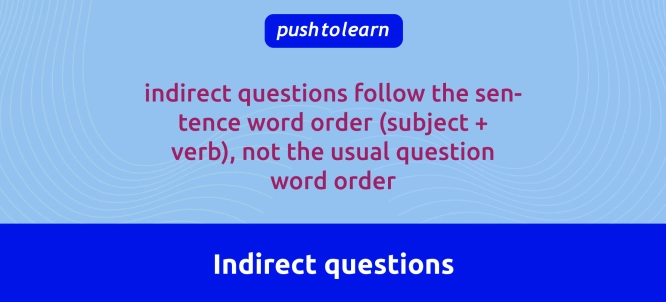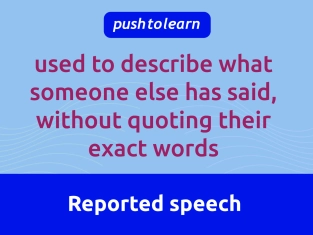by PushtoLearn
Indirect Questions
Table of Contents
Indirect Questions – Exercises
These exercises focus on Indirect Questions
What Are Indirect Questions?
Indirect questions are questions that are part of a longer sentence. Instead of asking directly, like "Where is the bank?" we might say:
"Can you tell me where the bank is?"
The main difference is the structure: indirect questions follow the sentence word order (subject + verb), not the usual question word order (auxiliary verb + subject + main verb).

Why Do We Use Indirect Questions?
-
To be polite: Instead of saying "What time does the bus leave?", it’s more polite to say:
"Could you tell me what time the bus leaves?" -
In formal situations: When talking to someone you don’t know well, indirect questions sound more respectful.
How to Form Indirect Questions
Indirect questions have two parts:
-
Introductory phrase:
-
Can you tell me...
-
Do you know...
-
I’d like to know...
-
Could you explain...
-
The question part: Follow statement word order (subject + verb), NOT question word order.
Example Table:
|
Direct Question |
Indirect Question |
|
Where is the nearest library? |
Can you tell me where the nearest library is? |
|
What does she want? |
Do you know what she wants? |
|
Is this the correct form? |
Could you tell me if this is the correct form? |
|
When does the train leave? |
Do you know when the train leaves? |
|
Why is he late? |
Can you explain why he is late? |
|
How much does it cost? |
Could you tell me how much it costs? |
|
Did she go to the party? |
Do you know if she went to the party? |
|
Are they coming tomorrow? |
Can you tell me whether they are coming tomorrow? |
|
What time is the meeting? |
Do you know what time the meeting is? |
|
Where did he put my keys? |
Can you tell me where he put my keys? |
Key Rules for Indirect Questions
-
No auxiliary verbs like do/does/did in indirect questions.
Direct: "Where does she live?"
Indirect: "Do you know where she lives?" -
Use question words (what, where, why, how) for wh-questions.
Direct: "Why is he late?"
Indirect: "Can you tell me why he is late?" -
Use if or whether for yes/no questions.
Direct: "Is she coming?"
Indirect: "Could you tell me if she is coming?" -
Word order follows statements: Subject comes before the verb.
Incorrect: "Do you know where is she?"
Correct: "Do you know where she is?"
Common Errors in Indirect Questions
|
Mistake |
Correct Form |
|
Do you know where is the market? |
Do you know where the market is? |
|
Can you tell me what does he like? |
Can you tell me what he likes? |
|
Could you tell me if does this train go to LA? |
Could you tell me if this train goes to LA? |
Everyday Use of Indirect Questions
At Work:
-
"Can you explain how this system works?"
-
"Do you know when the meeting will start?"
While Traveling:
-
"Could you tell me where the nearest train station is?"
-
"I’d like to know if this bus goes downtown."
Making Requests:
-
"Would you mind telling me why the project was delayed?"
-
"Do you know what time the bank closes?"
See also What's it mean or What does it mean?
FAQ
Why do we use indirect questions?
We use them to sound polite and formal, especially with people we don’t know well or in professional settings.
What is the main difference between direct and indirect questions?
Direct questions use normal question word order, while indirect questions follow statement word order.
How do I form an indirect question for yes/no answers?
Use if or whether. For example: "Is she coming?" → "Do you know if she is coming?"
Can I use "do/does/did" in indirect questions?
No, indirect questions don’t need these auxiliary verbs. For example: "Where does he work?" → "Do you know where he works?"
What are common phrases to start indirect questions?
-
"Could you tell me..."
-
"Do you know..."
-
"I’d like to know..."
-
"Would you mind explaining..."

